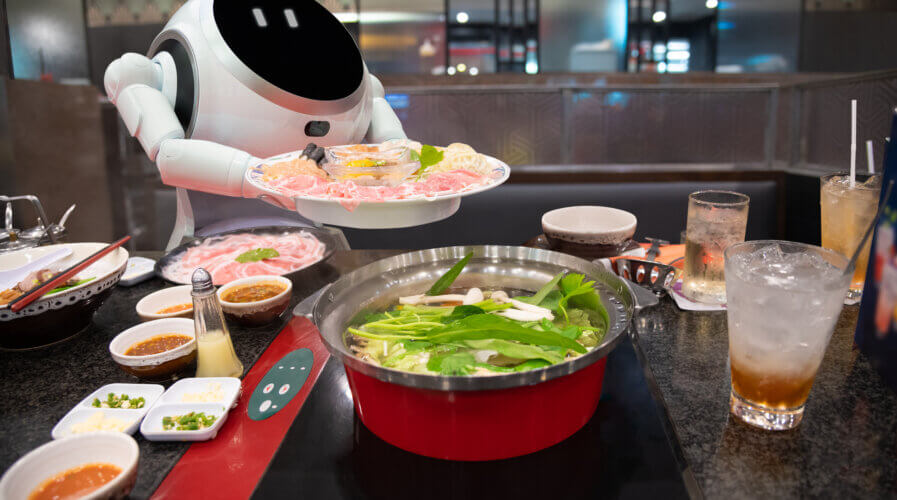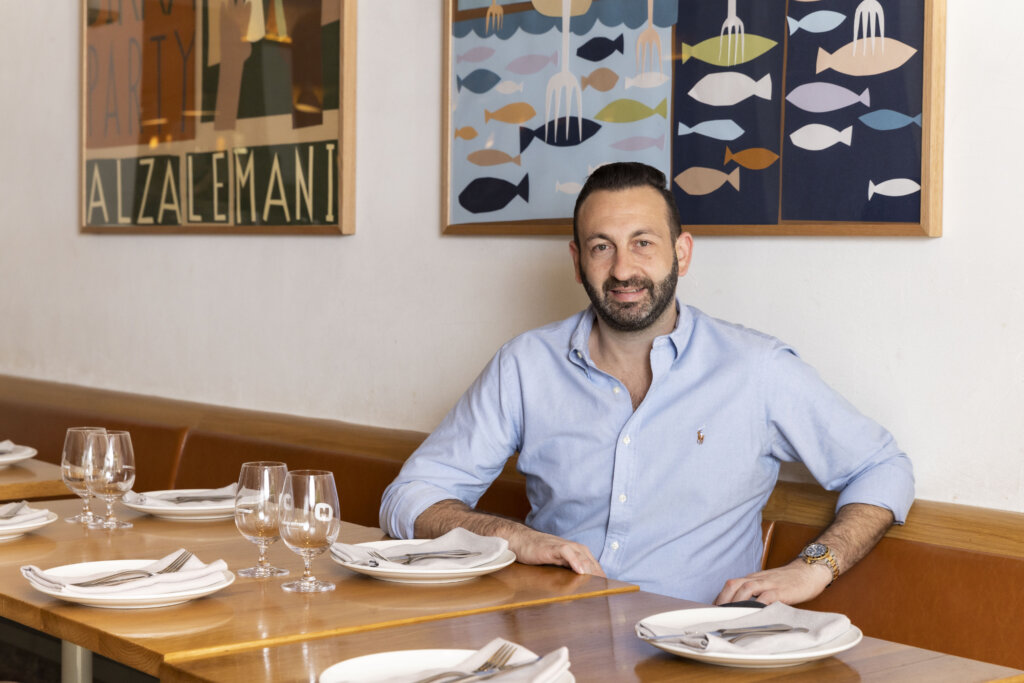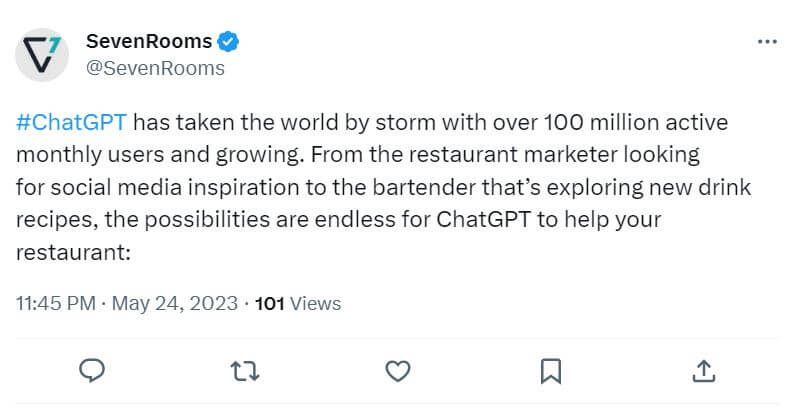
Apart from robots, generative AI can also help restaurants improve efficiency. (Source – Shutterstock)
Transforming the restaurant industry: 10 ways ChatGPT enhances efficiency and cost savings
|
Getting your Trinity Audio player ready... |
Article by Paul Hadida, General Manager, APAC at SevenRooms
In the fast-paced world we live in, it’s hard to ignore the buzz around ChatGPT. Its applications seem limitless, allowing users to streamline – through automation – previously tedious or time-consuming tasks. As a business working within the hospitality industry, where labor access is stretched and consumer expectations are rising, this got us thinking: How can ChatGPT revolutionize work for restaurants, bars and cafes in APAC?
While concerns about automation and its impact on jobs persist, one thing is certain: the human touch required for hospitality cannot be automated. Instead, AI allows operators to focus more on the guest experience by eliminating repetitive tasks and improving efficiencies. Time is a precious commodity for restaurant professionals, and ChatGPT can save both time and money.
Hospitality venues can use ChatGPT to not only streamline administrative jobs and reduce cost, though but to provide inspiration and ideas to help them enhance their business and brand in a matter of minutes. Here’s how.

Paul Hadida, General Manager, APAC at SevenRooms
ChatGPT: Providing Efficiency and cost savings
According to ChatGPT itself, it’s “a computer program that can talk to you like a human. It can understand what you’re saying and respond in a way that makes sense. It can also do things like translate languages, create content, and find information. It’s like having a smart, helpful friend you can talk to anytime!”
ChatGPT is not the first AI chat tool in the market. Two years ago, Jasper AI made waves in the business world with its language model designed for copywriters and content marketers. It’s certainly the first to truly transcend out of the technology community. Here’s how it’s being used by restaurants.
Food and drink inspiration
Axelrad Bar in Houston, Texas released a new cocktail menu entirely generated by ChatGPT. The venue decided to pit their bartenders’ skills against AI in a competition. The bartenders created their signature cocktails alongside AI-generated mixed drinks, and customers voted for their favourites.
Menus
Seeking menu inspiration for Chinese New Year, Deepavali, or Christmas? ChatGPT can be used by venues to come up with menu options as well as the specific recipe for any recommended dishes.

A Tweet by SevenRooms on ChatGPT use cases.
Website copy and landing pages
Even seasoned marketers need occasional inspiration, and ChatGPT can be a game changer for restaurants without dedicated marketing personnel. Building or maintaining a website requires time and resources that many operators don’t have. Fortunately, ChatGPT is fueled by vast amounts of internet data, so it likely knows a few things about a business if it exists online. Restaurants can ask ChatGPT to create customised website landing page copy, headlines, URLs, and even optimize pages for search engine optimization (SEO).
Copy translation and localization
In Singapore, known as a global hotspot for international tourists and expats, venues strive to cater to customers hailing from diverse nations. This necessitates the need for language translation, which, unfortunately, can be both intricate and expensive. But with the assistance of ChatGPT, the process of translating menus, email marketing and other text into multiple languages becomes swift and hassle-free. Moreover, ChatGPT can help regionalize messaging, identifying localized nuances to build customer trust.
Email generation and testing
Whether it’s for marketing campaigns, customer responses, or company-wide announcements, ChatGPT can help draft copy or provide inspiration. It can also be used as a tool to A/B test different versions, iterating on email performance. By putting the existing content into ChatGPT, it can generate new titles, subject lines, or CTAs for testing.
Social media strategies and tactics
ChatGPT is a treasure trove of social media post ideas and inspiration. It can help businesses to strategize by building a social media marketing plan for the restaurant and suggesting new tactics and tools. Additionally, ChatGPT can assist in planning the monthly social content calendar, providing dates, post ideas and caption inspiration.
Social media management
ChatGPT offers various use cases to support restaurants with social media marketing and management, such as generating new post ideas and messaging, drafting responses to follower comments and messages, researching hashtags, identifying social media influencers to collaborate with and transforming a blog article or press release into quick social posts.
Guest experience and relations
Restaurants receive a lot of emails and reviews. ChatGPT can help craft responses to customer reviews, whether they are negative or positive. Venues can simply add the review to the message box and ask ChatGPT to generate a response. And for restaurants looking to take ChatGPT to the next level, it can be integrated into the website through a chatbox or messaging widget. Think of it as the automated virtual assistant, capable of answering FAQs, suggesting menu items, and even processing online orders.
Employee experience
By implementing ChatGPT as a virtual assistant, venues can free up staff from fielding calls or carrying out manual tasks all day, allowing them to focus on greeting diners, seating tables and facilitating meaningful, exceptional experiences. ChatGPT can assist in writing job descriptions, onboarding documents, and even inspiring interview questions. It can also help in scheduling work hours for full-time and part-time employees.
What generative AI tools mean for the future of hospitality
Generative AI tools like ChatGPT are more than just a means to improve operational efficiency and overcome labor shortages in the hospitality industry. They hold the key to fostering loyalty and driving long-term growth strategies. By leveraging technology to automate processes, venues can effortlessly collect approved guest data, gain insights into individual customers’ preferences and behaviors, and deliver personalized, automated marketing campaigns. This automation frees up valuable time for venues to focus on meaningful face-to-face interactions that are cherished, recommended and rewarded by consumers across APAC.
The buzz surrounding ChatGPT and similar AI tools may persist for some time, but when the hype eventually subsides, businesses that have embraced these technologies will emerge as winners. Through software like ChatGPT and broader automation initiatives, the hospitality industry can work smarter, more strategically, and with streamlined efficiency. This transformation is especially significant for an industry often perceived as “traditional” and resistant to technological advancements.
Personalization lies at the heart of the restaurant experience, and AI has the potential to greatly reduce the effort required to provide tailored hospitality while maintaining exceptional standards and human connections. Embracing the possibilities offered by AI empowers restaurants to save valuable time and resources while elevating their business and brand. However, it’s important to remember that even with AI, the human touch remains indispensable in the hospitality industry. The fusion of technology and human interaction holds the key to delivering exceptional guest experiences and driving success in this ever-evolving landscape.
The views in this article are those of the author and may not represent the views of Tech Wire Asia
READ MORE
- Safer Automation: How Sophic and Firmus Succeeded in Malaysia with MDEC’s Support
- Privilege granted, not gained: Intelligent authorization for enhanced infrastructure productivity
- Low-Code produces the Proof-of-Possibilities
- New Wearables Enable Staff to Work Faster and Safer
- Experts weigh in on Oracle’s departure from adland


